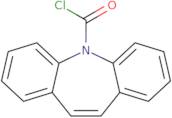Iminostilbene N-carbonyl chloride
CAS: 33948-22-0
Ref. 3D-FI24558
| 1g | Descontinuado | ||
| 2kg | Descontinuado | ||
| 50mg | Descontinuado | ||
| 100mg | Descontinuado | ||
| 250mg | Descontinuado | ||
| 500mg | Descontinuado | ||
| 0.01kg | Descontinuado | ||
| 0.001kg | Descontinuado | ||
| 0.002kg | Descontinuado | ||
| 0.005kg | Descontinuado |
Informação sobre produto
- 5H-Dibenz[b,f]azepine-5-carbonyl chloride
- 5-(Chlorocarbonyl)-5H-Dibenzo[B,F]Azepine
- 5-(Chlorocarbonyl)-5H-dibenz[b,f]azepine
- 5-Chlorocarbonyl Iminostilbene
- 5H-Dibenz[B,F]Azepine-5-Carbonyl Chloride
- 5H-Dibenzo[B,F]Azepine-5-Carbonyl Chloride
- Chlorocarbonyl Liminostilben
- Dibenz [B,F]Azepine-5-Carbonyl Chloride
- Iminostilbene Carbonyl Chloride (Bromine Free)
- Iminostilbene Carbonyl Chloride (Non-Bromine Free)
- Ver mais sinónimos
- Iminostilbene-5-Carbonyl Chloride
- N-(Chlorocarbonyl)-5H-dibenz[b,f]azepine
- N-Chlorocarbonyliminostilbene
Iminostilbene N-carbonyl chloride is an antimicrobial agent that inhibits the activity of cation channels in bacterial cells. It has been shown to be effective against P. aeruginosa and other bacteria, including Mycobacterium tuberculosis, with a minimal toxicity profile. The mechanism of action is not yet fully understood, but it may involve inhibition of the ion channel or direct interaction with the cell membrane. Iminostilbene N-carbonyl chloride was used to produce monoclonal antibodies against human inflammatory disease targets. These antibodies were produced by immunizing mice with imeostilbene N-carbonyl chloride and then extracting mouse spleen cells to produce hybridomas. One study showed that imeostilbene N-carbonyl chloride inhibited fatty acid synthesis in a model system of rat liver cells.





